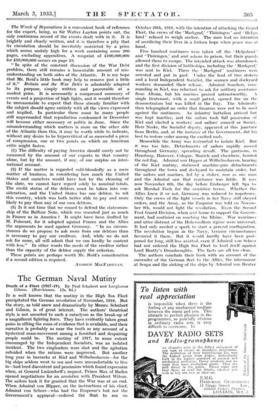The German Naval Mutiny
Death of a Fleet (1917-19). By Paul Schubert and Langhorne Gibson. (Hutchinson. 12s. 6d.) IT is well known that the mutiny in the High Sea Fleet precipitated the German revolution of November, 1918. But the story, as told anew and dramatically by Messrs. Schubert and Gibson, is of great interest. The authors' theatrical style is not unsuited to such a cataclysm as the break-up of a magnificent fighting force. They have evidently taken great pains in sifting the mass of evidence that is available, and their narrative is probably as near the truth as any account of a hysterical mass-movement among a famished and despairing people could be. The mutiny of 1917, to some extent encouraged by the Independent Socialists, was an isolated incident. the two ringleaders were shot and the agitation subsided when the rations were improved. But another long year in barracks at Kid and Wilhelmshaven—for the big ships seldom went to sea and were uncomfortable to live in—had bred discontent and pessimism which found expression when, at General Ludendorff's request, Prince Max of Baden opened negotiations for an armistice with President Wilson. The sailors took it for granted that the War was at an end. When Admiral von Hipper, on the instructions of his chief, Admiral von Scheer—who had the Emperor's but not the Government's approval—ordered the fleet to sea on
October 29th, 1918, with the intention of attacking the Grand Fleet, the crews of the `Markgraf," Thuringen ' and Helgo- land' refused to weigh anchor. The men had no intention of sacrificing their lives in a forlorn hope when peace was at hand.
Five hundred mutineers were taken off the Helgoland ' and ' Thuringen,' and sent ashore to prison, but their guards allowed them to' scape. The intended attack was abandoned, and the first division of battleships, including the • Markgraf.' was sent to Kid. There the • Markgraf ' mutineers were arrested and put in gaol. Under the lead of two stokers and a local Independent Socialist, the seamen and dockyard workers demanded their release. Admiral Souchon, com- manding in Kid, was reluctant to ask for military assistance from Altona, but his marines proved untrustworthy. A single lieutenant, with a small patrol, opened fire on the demonstrators but was killed in the fray. The Admiralty then telegraphed an order that firearms were not to be used against the mutineers. An infantry battalion arrived lmt was kept inactive, and the sailors took full possession of Kiel and elected a workers' and sailors council or Soviet. Herr Noske, the Socialist deputy, appeared at this juncture from Berlin, and, at the instance of the Government, did his best to restore order among the excited mob.
Meanwhile the Army was instructed to isolate Kid. But it was too late. Detachments of sailors rapidly moved throughout Germany, spreading revolt. The garrisons, in Hamburg, Hanover, Cologne. Munich and elsewhere, hoisted the red flag. Admiral von Hipper at Wilhelmshaven, hearing of the Niel mutiny, stationed machine-gun detachments throughout the town and dockyard to maintain order, but the sailors and marines, led by a stoker, rose as one man and the Admiral saw that resistance was futile. It was now November 6th, the day before Erebcrger left Spa to ask Marshal Foch for the armistice terms. Whether the Allies knew it or not, Germany was reduced to impotence. Only the crews of the light vessels in her Navy still obeyed orders, and the Army, as the Emperor was told on Novem- ber 9th, would not fight the revolution. Even the Second Foot Guard Division, when sent home to support the Govern- ment, had mutinied on reaching the Rhine. War weariness and utter distrust of the Hohenzollern regime were universal. It had only needed a spark to start a general conflagration. The revolution began in the Navy, Lecause circumstances favoured it there. But it would hardly have been post- poned for long, still less averted, even if Admiral von Scheer had not ordered the High Sea Fleet to hurl itself against Lord Beatty's Dreadnoughts. The facts are all too clear.
The authors conclude their book with an account of the surrender of the German fleet to the Allies, the internment at Scapa and the sinking of the ships by Admiral von Reuter
on June 21st, 1919, two days before the armistice was to expire. It is shown that the German Admiral acted under a mistaken belief that the armistice had ended and that a state of war was again in force. In any case the Allies had reason to be grateful to him for relieving them of the awkward and even dangerous problem of determining how the sur- rendered ships should be shared out among the Powers. We certainly did not want any of them : we had proposed that they should all be sunk in the Atlantic. But some of our Allies had different views, and a long and troublesome controversy might have arisen but for Admiral von Reuter.
EDWARD HAWKE.



















































 Previous page
Previous page